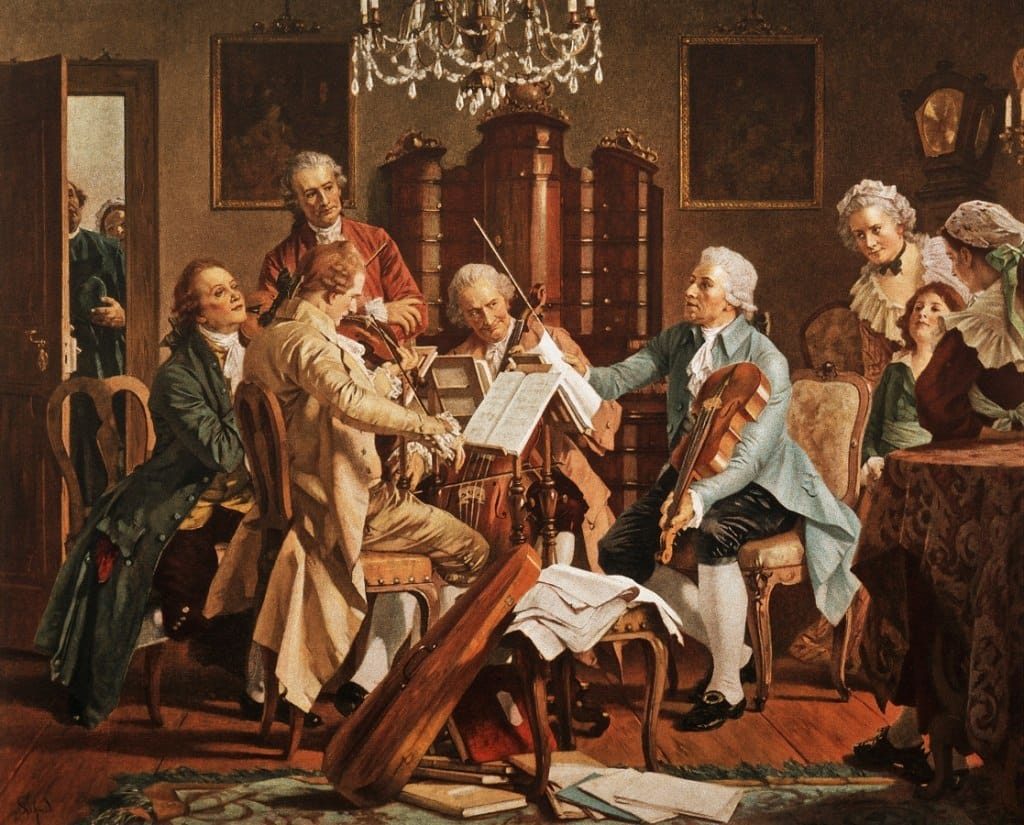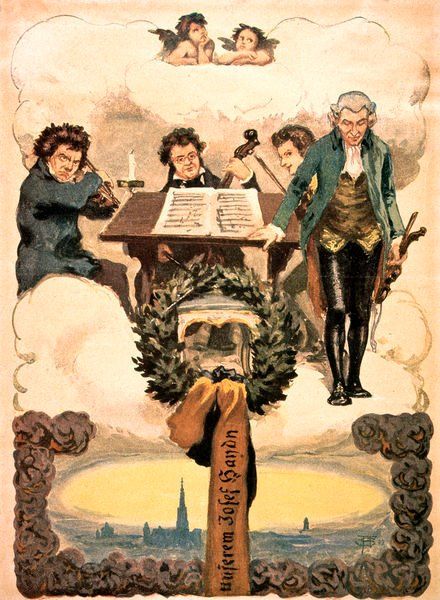The Viennese School

Haydn, Mozart, Beethoven and Schubert: did the four Viennese school composers know each other? By Manohar Parnerkar
The Classical period in Western art music represents the age of Haydn, Mozart, partly of Beethoven, and peripherally of Schubert. Falling between the post-Baroque and the pre-Romantic periods, it roughly dates from 1750 to 1830. The important music of this period, contributed almost entirely by these four composers, has been universally celebrated for its permanent rather than ephemeral value.
During the time of the Viennese school composers, Vienna was the musical hub of Europe. If you were a musician with talent and ambition, and wanted to make it to the big league, Vienna beckoned. And this is how Haydn, Mozart and Beethoven, near contemporaries all, at different points in their careers, gravitated to Vienna. Vienna had been the seat of the Holy Roman Empire from 1558 to 1806 and of the all-powerful Habsburg ruling dynasty from 1282 to 1918. The music of three of the Viennese school composers (Schubert was an exception) was greatly influenced by the Habsburg rulers, and the provincial heads under them, who were the most important patrons of music in all of Europe.
Did the four composers know each other?
Haydn was born in 1732 in Rohrau, Austria; Mozart in 1756 in Salzburg, Austria; Beethoven in 1770, in Bonn, Germany; and Schubert in 1797 in Vienna. Haydn was the oldest of the Viennese quartet and Schubert the youngest. Haydn came to Vienna in 1792 when he was 60; Mozart in 1781 when he was 25; and Beethoven in 1792 when he was 22. All four died in Vienna.
Interestingly enough, both Mozart and Beethoven had not only met Haydn, but were connected with him, although in different capacities and at different times. Mozart, who was nearly half of Haydn’s age, became his dear friend, and Beethoven was Haydn’s pupil for more than a year. Mozart and Beethoven did meet, although, sadly, this was to be their only meeting. Schubert, for reasons I will explain later, never met any of the three Viennese composers.
Beginnings of a great friendship
The first time Haydn and Mozart met was in 1781, in Vienna. Papa Haydn, as he was affectionately called by those who knew him, was 49 at the time, and Mozart was 25. The meeting led to a warm and lasting friendship in which each gave to and learned from the other. Both were secure men who, instead of becoming rivals, came to admire and respect each other. They also enjoyed each other’s company, and at least on one occasion actually made music together. There is a fascinating account of a party given by Stephen Storace, a British composer and a common friend of the two, in Vienna, in 1784, at which Haydn, as a violinist, and Mozart, on the viola, were part of the foursome that played a string quartet. Michael Kelly, a composer-singer who was at the party, recalled later, “A greater treat could not be imagined.”
Did their significant age difference ever come in the way their friendship? Not really, and this was because Mozart, as George Bernard Shaw once described him, had the charm of a child at 30, just as he had the seriousness of a man at five. The Mozart who met Haydn in 1781 had already matured way beyond his years – both as man and composer. He had packed in his tempestuous 25 years as much or, perhaps, more of life’s experiences as Papa Haydn would have in his relatively tranquil 49. He had also by then accumulated as much, if not greater, musical wisdom as his older friend. So, theirs was, in more ways than one, a friendship between equals. Interestingly, both Mozart and Haydn became Freemasons in 1784, and it is widely believed that it was Mozart who successfully persuaded the initially reluctant Haydn to enter Freemasonry.
Haydn and Mozart were also influenced by each other’s music. The two were influenced by each other’s symphony writing, but Mozart was also greatly influenced by Haydn’s quartet writing, and had actually dedicated a set of his six string quartets to him. These quartets, Nos. 14 to 19, later came to be known as the Haydn Quartets. Haydn returned Mozart’s compliment with a set of his own Opus 50 Quartets. When Haydn heard Mozart’s string quartets, he is supposed to have remarked to Leopold Mozart, his father, “Before god, and as an honest man, I will tell you that your son is the greatest composer known to me, either in person, or by name. He has taste, and what is more important, the most profound knowledge of composition.”

Did Beethoven and Mozart ever meet?
The two immortals of the music world met in April 1787, in Vienna. The meeting would have truly been, pardon the cliché, a sight for the gods. Mozart, then 30, was at the peak of his creative power and fame. The prodigiously gifted Beethoven, then only 17, had journeyed to Vienna to become the old master’s pupil. Beethoven first played a much-practised and set piece of music on the piano which, expectedly, left Mozart totally unimpressed. The young lad then requested the master, and got from him a theme which he brilliantly extemporised, enlarged and varied. That seemed to have done the trick. A visibly impressed Mozart is supposed to have remarked to a friend who was present, “Keep your eyes on him. Someday he will give the world something to talk about.” Prophetic words these, for the young lad gave the world so much to talk about that it has been ceaselessly doing it for the last 200 years. And there is reason to believe that it will go on doing so as long as there is music in this world. It is likely that after this encounter, Beethoven may have received a lesson or two from Mozart. But within two weeks, he had to return to Bonn to attend to his dying mother. And when he finally came back to live in Vienna, in 1792, Mozart had been dead for a year. Beethoven would now be receiving the ‘spirit of Mozart’ from Haydn’s hands.
Beethoven met Haydn in 1792 in Bonn. Count Waldstein, a great music lover and Beethoven’s friend, admirer and benefactor, had successfully persuaded Maximilian Franz, the elector of Bonn, to bankroll Beethoven’s training under Haydn. So, in November 1792, Beethoven journeyed to Vienna to study musical theory, counterpoint and techniques of composition with Haydn, for more than a year. The guru- shishya didn’t quite hit it off. The association between Haydn and Beethoven was not a total disaster, but it wasn’t a particularly fruitful one either. It is difficult to imagine two men more dissimilar in personality, temperament and even their basic approach to music. What must have only accentuated these inherent differences was the timing of their association. When the two came together, Haydn had already achieved spectacular fame as the greatest composer of his day. The old master, then 60, had no great motivation left to share his musical knowledge and wisdom with a 22-year-old untamed, brash, highly opinionated and generally insufferable pupil like Beethoven. From all historical accounts, Haydn also doesn’t emerge as a particularly great teacher, but to be fair to him, not even the most learned of pedagogues could have designed a teaching manual for a genius like Beethoven.
Beethoven after sometime became disenchanted with his guru for not devoting enough time to him, and found an eminently practical solution to his problems. He sought instruction from others, of course, behind Haydn’s back. Haydn, on his part, found the pupil’s grasp of counterpoint and musical theory weak. In short, Haydn found Beethoven the shishya wanting (and Beethoven found Haydn the guru lacking). Although there was never any rancour or open discord, their basic incompatibility eventually led to a parting of ways. And yet – and this is important – Beethoven never lost respect for Haydn the composer, and later dedicated his three piano sonatas – Op. 2 of 1795 – to him.
Schubert’s loss
Schubert, the last of the Viennese school composers, was born in 1797. Mozart had been dead for six years; while Haydn died in 1809 when he was 12. Which leaves Beethoven, whom Schubert simply worshipped, and would have given both arms to meet. Beethoven knew about Schubert, and was quite impressed with his lieder. But for reasons, which may sound strange to the reader, the two never met. Schubert was pathologically timid, and was in such great awe of the Olympian figure of Beethoven; he could never muster enough courage to meet him. The only time he met Beethoven was when the latter was on his deathbed, which must have been more of a darshan for the Beethoven devotee than a meeting. The young Schubert was a pall-bearer at Beethoven’s funeral, and on his tragically early death at 31, was buried next to his idol: a most poignant case of too little, too late.
This piece was originally published by the National Centre for the Performing Arts, Mumbai, in the June 2018 issue of ON Stage – their monthly arts magazine.





